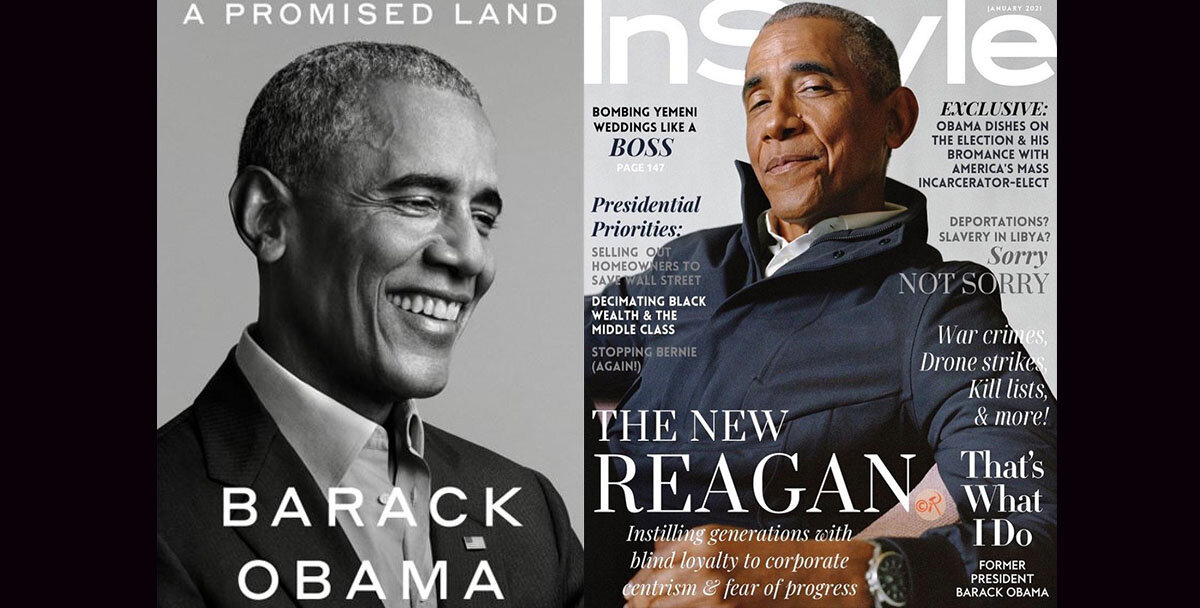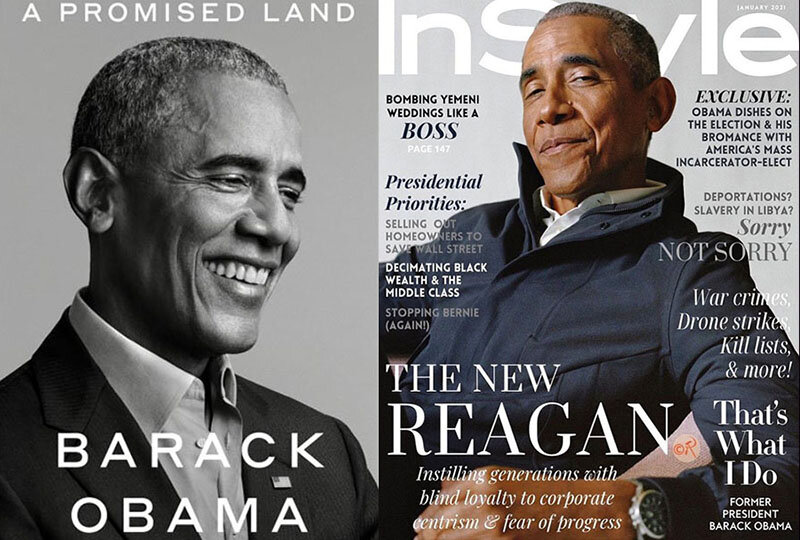
Mara Ahmed
Obama’s new book, A Promised Land, has been making the rounds. It’s everywhere on social media, much like Michelle Obama’s Becoming was a couple of years ago. Both dust jackets glow with the same Photoshop finish, two attractive people a bit shy about the strength of their own magnetism. Smart, effortlessly debonair, moneyed. Diametrically opposed to Trump’s vulgarity, civilized in their discourse (“I felt quietly angry on his behalf. To protest a man in the final hour of his presidency seemed graceless and unnecessary,” he writes about Bush), and confident in the gushing response from their stans.
Obama, the drone president. The man who dropped 26,171 bombs his last year in the White House. Literary rock stars like Chimamanda Ngozi Adichie and Zadie Smith fangirl over his remarkable writing and unimaginably difficult presidential decisions. The decency of his character is assured, in spite of his war crimes. He’s got a multimillion-dollar Netflix deal after all, and the power to gift us Joe Biden.
He makes us feel nostalgic for the good old days, when America was truly great. Everyone knows he killed almost 4,000 people in 542 drone strikes, deported more than 2.5 million others, and force-fed Muslim men categorized as non-human in Guantanamo. He expanded mass surveillance, sabotaged universal healthcare, built migrant cages at the border, and pretended to drink Flint water in order to lie about its safety.
He didn’t just do the broadly brutal, presidential butchery we expect from American presidents, he made it personal. He handled kill lists, droned a 16-year-old American kid in Yemen along with his 17-year-old cousin, started spanking new wars, and called the president of Yemen to halt the release of a journalist reporting on drone casualties in that country.
Yet here we are.
Symbolic firsts are no substitute for substantive gains. We have been celebrating firsts for fifty years but the gains for the few almost never translate into a better life for the many. Check out Lightfoot in Chicago. These celebrations are old and our people are dying. Enough.
— Keeanga-Yamahtta T. (@KeeangaYamahtta) August 12, 2020
The boring repetition of these atrocities can be set aside easily. Pictures of dead children or their wailing mothers don’t really register if they’re not wearing the right clothes or speaking the right languages. We can say sensibly that collateral damage is a price we are willing to pay, as long as someone else is actually paying that price. Would we be equally understanding about the droning of our own children for the greater good of the world? Why is that a crazy question?
Seems graceless to bring all of this up, right after the launch of Obama’s elegant oeuvre. Accusations of crudeness remind one of Houria Boutelja’s book Whites, Jews, and Us which so offended white sensibilities. Anthropologist Nazia Kazi explicates how Boutelja “claims this crudeness as a very marker of her social position: ‘The dispossessed indigenous person is vulgar. The white dispossessor is refined.’ What are civility, vulgarity, and manners in a world shaped enduringly by the brutality of empire?” she asks.
Maybe that’s just how it is these days: everything whitewashed, packaged like an Apple product, branded like a captivatingly effete IG influencer, and placed adroitly like sponcon. It’s hard to tell the news from the ads, Hollywood films from military propaganda, or Nobel Peace Prize winners from assassination masterminds. Everything’s pulverized together into a bland paste of vacuity. Makes one hungry for guerrilla filmmaking and some raw, unvarnished truth.
• • •
As we look forward to a Kamala Harris vice presidency, pictures of her channeling Ruby Bridges and Rosa Parks have gained popular currency online. Representation continues to be a means of achieving multiculturalism, without challenging the structures it dresses up.
What about Harris’s actions? Out of the millions of undertakings she could have prioritized, as San Francisco D.A., she decided to crack down on school truancy. One of her regular shticks at speaking events was to tell the story of how she brought charges against a single mother of three, who was homeless and working two jobs. It demonstrated the tough love of her anti-truancy initiative, the fear she could instill by an artistic rendering of her badge on her letterhead. In another talk, she made fun of criminal justice reformers, mimicking their protests on stage. It’s painful to watch — her flippancy, arrogance and cluelessness.
Harris is younger than many of the men in leadership positions around her. Perhaps she will begin to align more with what’s happening in the country. But it bears repeating that representation doesn’t go very far when it’s only a symbol of individual success. Unless people of color in positions of power, challenge existing systems and try to improve the lives of the most marginalized, their “diversity” is just about optics.
In the words of Keeanga-Yamahtta Taylor:
“Symbolic firsts are no substitute for substantive gains. We have been celebrating firsts for fifty years but the gains for the few almost never translate into a better life for the many… These celebrations are old and our people are dying. Enough.”
TMR supports the Universal Declaration of Human Rights and as such reserves the right to allow its contributors to criticize any country, including (for example) Israel, the USA and Saudi Arabia. We have no sacred cows here. We honor freedom of expression above all else. That said, the views expressed by independent columnists do not represent the official policy of TMR.

Join Our Community
TMR exists thanks to its readers and supporters. By sharing our stories and celebrating cultural pluralism, we aim to counter racism, xenophobia, and exclusion with knowledge, empathy, and artistic expression.
Learn more


